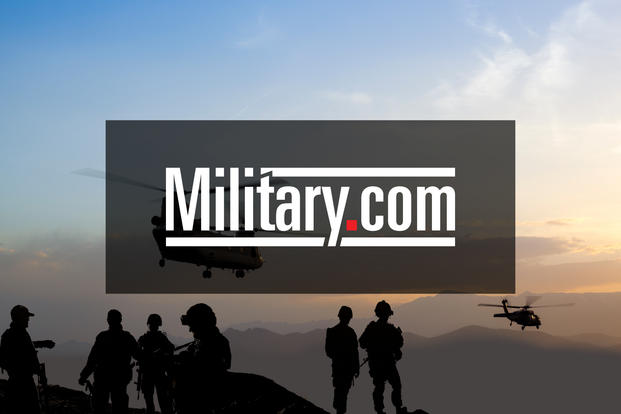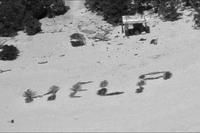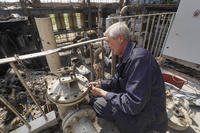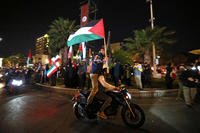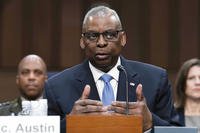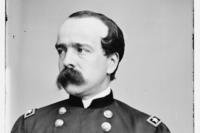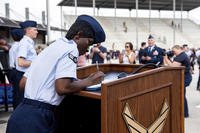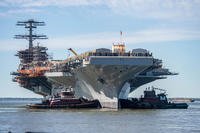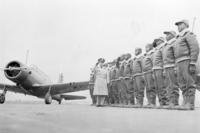The continuing U.S. mission in Iraq has been thrown into question even as ISIS is on the brink of defeat unless the Kurds and the Baghdad central government can avoid all-out conflict over Kurdish demands for independence, a U.S. military spokesman said Monday.
"I'm not going to speculate on that," Army Col. Robert Manning said of the possibility of a U.S. pullout, "but I'll tell you we're looking at all options" in response to the dispute over the Kurds' goal of secession of their mostly autonomous northern region.
"We encourage dialogue," he said.
Manning, director of the Pentagon's press office, made the comments to defense reporters after the Iraqi Security Forces moved to retake the oil-rich north-central city of Kirkuk, where the Kurds have held sway since the Islamic State of Iraq and Syria swarmed into Iraq in 2014.
Neither side gave a casualty toll for the operation, but an aid group working in Kirkuk said several Kurdish Peshmerga fighters and Iraqi soldiers had been killed in an overnight clash south of the city, Reuters reported.
In a statement, the U.S.-led coalition in Iraq said any clashes between the Kurds and the Iraqi forces may have been the result of a "misunderstanding" on troop movements.
"These movements of military vehicles, so far, have been coordinated movements, not attacks," the statement said. "We believe the engagement this morning was a misunderstanding and not deliberate as two elements attempted to link up under limited visibility conditions."
The New York Times, reporting from Kirkuk, said the ISF, including units of the Shiite Popular Mobilization Forces supported by Iran, entered the city to cheering crowds as the Kurdish Peshmerga forces mostly abandoned their positions, with the exception of a few skirmishes on the outskirts.
The Times also reported disarray in the Peshmerga ranks.
Officials of a Kurdish opposition party, the Patriotic Union of Kurdistan, said their fighters would cooperate with the ISF, while those of the governing Kurdistan Democratic Party of Masoud Barzani, president of the Kurdistan Regional Government (KRG), continued to resist.
The Kurdish news agency Rudaw reported that thousands of residents of Kirkuk, a multi-ethnic city of about one million Kurds, Turkmens and Arabs, were fleeing to Irbil, capital of the Kurdish region.
The KRG went ahead with a non-binding independence referendum Sept. 25 that received more than a 90 percent "Yes" vote, despite the pleas of the U.S., its allies and the United Nations to cancel, or at least postpone, the vote to avoid undermining the final stages of the fight against ISIS.
ISIS' hold on Iraq has been reduced to a last stronghold in Al Qaim in Anbar province on the Iraq-Syria border amid reports of demoralized ISIS fighters fleeing the battlefield or surrendering.
In Syria, the U.S.-backed Syrian Democratic Forces, a mix of Arab and Kurdish fighters, were beginning a final push to retake Raqqa, the so-called capital of the ISIS "caliphate."
At the White House, President Donald Trump called on the ISF and Kurds to drop their territorial dispute and refocus on ISIS.
"We don't like the fact that they're clashing. We're not taking sides, but we don't like the fact that their clashing," Trump told reporters.
"We've had for many years a very good relationship with the Kurds, as you know. And we've also been on the side of Iraq, even though we should have never been in there in the first place," he said, repeating his statement during the presidential campaign that the 2003 invasion of Iraq was a mistake.
"We should never have been there, but we're not taking sides in that battle," Trump said of the new conflict between the Kurds and the Baghdad government.
In statements, Iraqi Prime Minister Haider al-Abadi said the action in Kirkuk was necessary to "protect the unity of the country, which was in danger of partition."
"We call upon all citizens to cooperate with our heroic armed forces, which are committed to our strict directives to protect civilians in the first place, and to impose security and order, and to protect state installations and institutions," he said.
In Baghdad, Army Col. Ryan Dillon, a spokesman for Combined Joint Task Force-Operation Inherent Resolve, sent out a Tweet urging all sides to "avoid escalatory actions. Finish the fight vs. ISIS, biggest threat to all."
In a briefing from Baghdad to the Pentagon last week, Army Maj. Gen. Robert White, commander of Combined Joint Forces Land Component Command-Operation Inherent Resolve, suggested the Kurdish-Iraqi dispute is distracting from the fight against ISIS as it neared conclusion.
"Daesh [another name for ISIS] is fighting for survival. The physical caliphate has been defeated" with the ouster of ISIS fighters from 95 percent of Iraq's territory, he said.
"They're starting to run away, and they're starting to surrender," White said. "They're losing, they know they're losing, and they're on their way out."
"We're here to help the Iraqi Security Forces defeat ISIS," White said. "What's happening between the KRG [Kurdish Regional Government] and GOI [Government of Iraq] is political in nature, and it's for them to resolve."
White disclosed that he met in late September in Irbil with Barzani on the way forward following the independence referendum.
Barzani "was concerned that the coalition would stop providing support to his forces in the form of training," White said. "I assured him that that was not the case" and the training would continue "until I was instructed or ordered otherwise. And it has to date, and we are still programming that training well into the future."
-- Richard Sisk can be reached at Richard.Sisk@Military.com.
